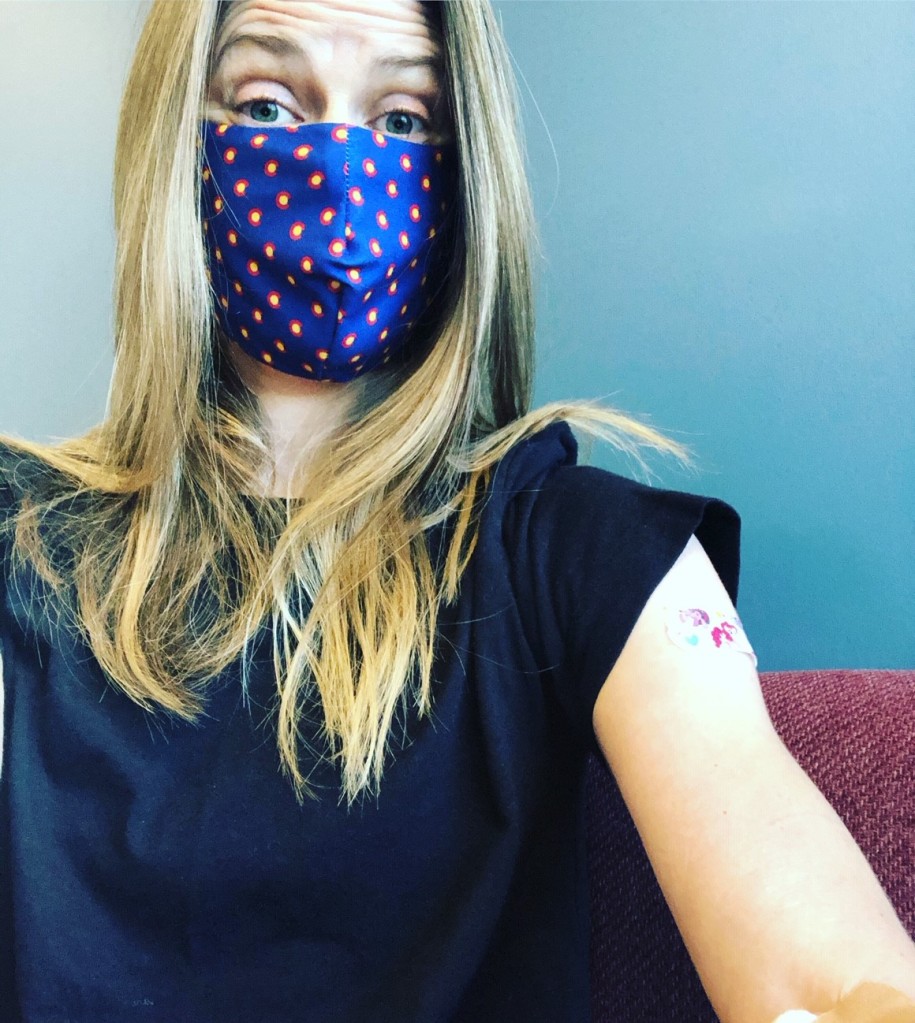Guest Post by Angie Anderson
A year ago, no one could have imagined how different the world would be today. Pandemic life is hard: lock downs, capacity restrictions, masks, school shutdowns and online learning, and the worst part—climbing death counts. With a husband who works in the COVID-19 unit of the ICU, I realize how debilitating and potentially deadly a severe case of COVID-19 can be. I don’t want to get this virus and I don’t want to contribute to community spread either. For all these reasons, my family is anxiously awaiting a safe and effective vaccine, which is why I jumped at the chance to participate in a vaccine trial.

This summer I signed up for both the Pfizer and Moderna trials online and was excited to hear back from Pfizer. After a couple of screening phone calls (asking about things like overall health, prior COVID-19 diagnosis, lifestyle, etc.), my first appointment was scheduled. The day before the appointment I got an email with multiple documents, the most important a consent form with information on the trial: background info on the mRNA vaccine candidate and the placebo (saline), risks of participation, trial observation period (multiple appointments over 24 months), other expectations (electronic diary to fill out weekly), and more. I spent quite a bit of time reading beforehand to make sure I understood.
Once I arrived, I was given a tablet with the same consent forms I’d been emailed along with an overview from the site coordinator to make sure all my questions were answered before I signed electronically. There were a few of us there at once, all masked up and spaced out appropriately, of course. During this appointment I had a full physical exam with a physician (also referred to as the “PI” – principal investigator at the study site), a pregnancy test, a COVID-19 nasal swab test, and a few vials of blood drawn. I must have passed these tests (I’m not pregnant, I haven’t had COVID-19), because I was pretty quickly called back to get my shot.
For a bit of background, this trial is a double-blind, placebo-controlled study. To break that down, I’ll start with placebo-controlled: in this trial, the placebo is nothing but saline. Double blind means that neither the PI (the physician at the site, as I mentioned above) nor I know if I got the vaccine or the placebo. There’s a 50/50 chance I got one or the other. It’s important that I don’t know which I got so that neither my behavior nor my perception of potential symptoms is affected. It’s important the PI doesn’t know which I got so that the treatment he gives me, and interpretation of any data, is unbiased. These features of the study and the professionalism of the clinic staff have given me a lot of confidence in the vaccine research process overall.
Once I was in the chair and ready to get my shot, I got my phone out to take a selfie, but the nurse quickly stopped me. The vaccine and the placebo actually look different, so study participants are asked to look away during the injection, and photos aren’t allowed. Apparently, the syringe is covered with tape as an extra precaution, but I didn’t see it. Again, it’s important that people don’t know whether they’ve received vaccine or placebo. The injection stung going in, but it was quickly over. I felt very little soreness in my arm and over the next couple of days I felt some fatigue—but I’m a mom of two small children, so I often feel tired (ha). The day after, I ran 7 miles no problem. If I got the vaccine, it affected me very little.
I’m going to be honest—if I got the placebo, I’ll be disappointed. I know for the study to be effective they need both a vaccine and placebo group, but I selfishly signed up hoping for the vaccine. If I got the placebo I’m content to be contributing to the research, though, and I still get the first-hand experience—now I understand how the process works.
I’m looking forward to making my way through the next steps of the trial, and anxiously awaiting data that shows one of these vaccine candidates are safe and effective. If you’re curious, please consider enrollment in a trial. We need many diverse volunteers to determine if these vaccine candidates work for everyone. Vaccines have helped eradicate and eliminate viruses in the past; let’s hope we can do it again!
There are currently COVID-19 vaccine and research studies in progress at both University of Colorado and Children’s Hospital Colorado. For more information on these, contact: JanssenENSEMBLEVaccineCHIP@childrenscolorado.org.
For additional information about other ongoing trials, visit https://www.coronaviruspreventionnetwork.org/.
Angie Anderson is a Colorado parent and pro-science vaccine advocate with Colorado Parents for Vaccinated Communities.
